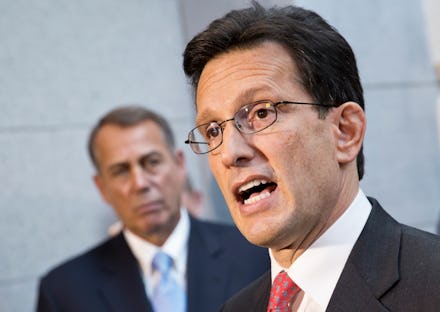How the Conservative Way Of Thinking Got America Into a Really Big Mess

The Senate has presented its bipartisan bill to end the government shutdown and avert a debt default. With the fate of America's financial future now resting in the hands of right-wing firebrands, it is perhaps appropriate to remember the words of Edmund Burke, the 18th century British statesman widely regarded as one of the great paladins of conservative thought:
"It is a general popular error to suppose the loudest complainers for the public to be the most anxious for its welfare."
Let us remember that this whole mess began because the Tea Party — a small fraction of the great pluralistic organism that is the American body politic — has been obsessed with defunding (or at least significantly altering) the Affordable Care Act. If they had managed to propel the Republicans to recapture Congress and the White House, they would have likely been successful in repealing the bill. Unfortunately for them, their only success was in taking the House of Representatives back in 2010, with national voters choosing to keep the Senate in Democratic hands after two election cycles and returning Barack Obama to the White House in 2012. Even worse, there are enough moderate Republicans in the House that they can't use traditional parliamentary processes through that body to browbeat the Senate and White House into doing their bidding.
If America was dealing with a mature political movement, they would handle their frustration by either (a) accepting the verdict of a people who, though certainly not altogether pleased with Obamacare, do not support completely defunding it or using other radical means to eliminate it or (b) biding their time until the next election cycle and preparing a scathing anti-Affordable Care Act case against Obama and the Democratic Party at that time.
If America was dealing with a mature political movement, they would handle their frustration by either (a) accepting the verdict of a people who, though certainly not altogether pleased with Obamacare, do not support completely defunding it or using other radical means to eliminate it or (b) biding their time until the next election cycle and preparing a scathing anti-Affordable Care Act case against Obama and the Democratic Party at that time.
While there is little question that the rightist zealots in their base would never accept Option A, it won't be as easy for them to push Option B as one might think. Sure, there is little doubt that they will focus on Obamacare at least during their primaries, when the Tea Party can make or break even the most firmly entrenched GOP incumbent. The general election, however, will be much trickier. Now that many of Obamacare's key provisions are slated to take effect over the next 12 months (including the establishment of health insurance exchanges, expansion of Medicaid eligibility in participating states, the application of the individual mandate, prohibitions on discriminating against individuals based on gender or pre-existing medical conditions, and prohibitions on applying annual spending caps for essential health benefits), there is the possibility that the Affordable Care Act will be too popular — dare I say successful? — to be the lodestone around Democrats' necks that they want it to be. While there have been early hiccups in Obamacare's implementation (albeit nothing worse than has accompanied other major social welfare programs in their early stages), experts tend to feel that the Affordable Care Act is likely to succeed. If they are wrong, of course, the Tea Party and its libertarian and conservative enablers will be able to crow about their vindication all the way to the ballot box. On the other hand, if Americans have warmed up to the Affordable Care Act by November 2014, they will never have another opportunity to repeal it. The egg won't merely be splattered on their face; it will be branded there.
Within this context, the causes of the government shutdown and potential debt default become crystal clear:
- Because they can't pass an Obamacare repeal through Congress and with a Republican president's signature (or at least over Obama's veto), and they can't afford to wait until the 2014 elections for another shot, they need to hold the economy hostage now as a last-ditch effort.
- Because there are enough moderate Republicans in the House of Representatives who would support a government funding bill that didn't eviscerate Obamacare, Speaker of the House John Boehner (R-Ohio) has used the so-called "Hastert Rule" to refuse to call a vote (the Hastert Rule, named after Boehner's Republican predecessor, calls on GOP speakers to refuse to put bills to a vote unless a clear majority of Republicans will support them, as opposed to a majority of the House itself).
This brings us back to that Edmund Burke quote. Anyone who has attempted to contribute to America's ever-evolving political discourse has noticed that the voices of the Tea Party, as well as their libertarian and far right-wing fellow travelers, have been among the loudest and most vehement in our public discussion. To the self-proclaimed patriots in those movements, they are no doubt responding to Samuel Adams's legendary call for "irate, tireless minorities" who are "keen on setting brushfires of freedom in the minds of men."
Indeed, it is valuable to recall James Madison's warning that "in Republics, the great danger is, that the majority may not sufficiently respect the rights of the minority."
The purpose of this op-ed is not to dismiss the Tea Party/libertarian/far-rightist view simply because it is a minority position (there are far better reasons for dismissal). Instead it is to point out that, even though the minority which supports wrecking our economy in the name of destroying Obamacare is very passionate, that passion doesn't make them any wiser, more patriotic, or more perceptive than the centrists, progressives, and other ideological groups which choose less melodramatic rhetoric and courses of action.
Indeed, unless they pass the Senate bill just proposed, they may very well be less so.